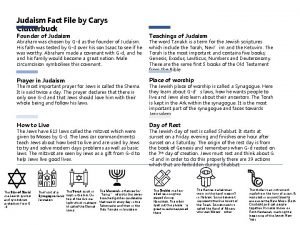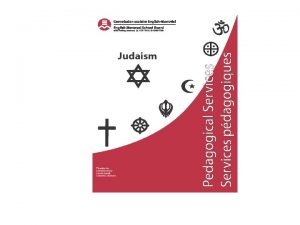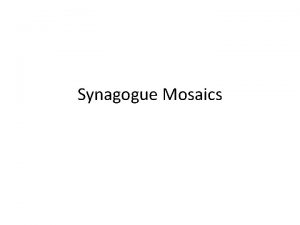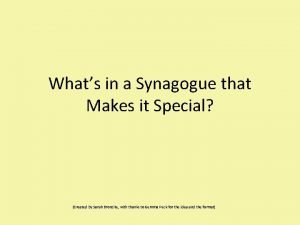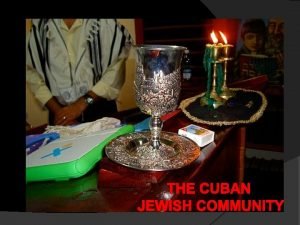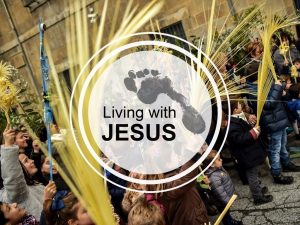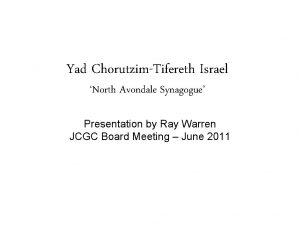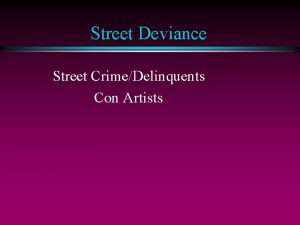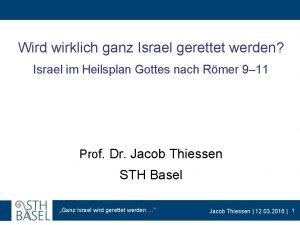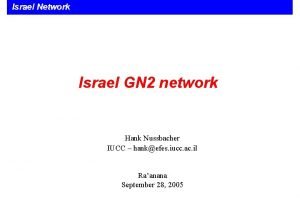Adath Israel synagogue from the street The first
















































- Slides: 48



Adath Israel synagogue from the street The first Jews probably arrived to Cuba after the expulsion from Spain in 1492. They were mostly Marranos, the forced Jewish converts to Catholicism. During the 16 th and 17 th centuries, Jews immigrated to Cuba from Brazil. In the late 1800's, Jews from the Dutch Antilles settled in Cuba.

Adath Israel, the Orthodox synagogue sanctuary

Chairs at Adath Israel Orthodox Synagogue

The women's section

Ashkenazi Jews born in Romania and Eastern Europe came to Cuba to work for U. S. -owned plantations and businesses in the 20 ties. Among them was also Ervin’s grandfather , but he returned to Romania after a few months.

In the kitchen at Adath Israel where the members do all the cooking.

A large number of Jews immigrated to Cuba from 1910 until 1920, including Sephardic Jews from Turkey. Jews continued to seek asylum in Cuba during the Holocaust. At the beginning of World War II, Ashkenazi Jews from Poland arrived in Santiago fleeing Nazi persecution. At the time of the Revolution in 1959, Cuba’s Jewish population peaked at 15, 000 people.

Embroidering kippot at Adath Israel. Hand made dolls are displayed in the background.

Centro Sefaradi sanctuary

The ope n ark at After the Revolution there were restrictions against religious groups. Jewish life suffered in Cuba, but never disappeared. Cuban Jewry faced increased assimilation and its elders were worried about the community’s future. Centro S efarad

Just after the fall of the Soviet Union in the late 1980 s, Castro proclaimed religious freedom for all. The government even provides some financial support for religious organizations. For the Jewish community in Cuba, most money comes from international Jewish organizations from the United States and Europe. New Ner Tamid

Tu B’Shevat in Havana

Camagüey

The museum is a house that was built around 1824. This is the entrance area.

The facade of the museum

The Israeli folk dance group from Camagüey is featured to the left.

In the museum there are cases showing Jewish culture and religion.

The American Jewish Joint Distribution Committee (JDC) was instrumental in rebuilding Cuba’s Jewish population. Since 1992, the JDC has sent rabbis and community organizers to help with education and to perform ceremonies.

New Havdalah set brought to Camagüey from Jerusalem

Santa Clara

The stone is from Kolodno Street in the Warsaw Ghetto. It was donated by the Holocaust Museum in Washington D. C. and carried to the community by Miriam Saul from Atlanta, GA

The Holocaust Memorial in Santa Clara is quite complex. The railroad tracks lead to hopes for the future.

Virginia

Virginia ‘s kitchen


The Patronato, the Jewish community center and Conservative synagogue in Havana. Casa de la Comunidad Hebrea de Cuba El Patronato

Purim - Making Hamentaschen for Purim at the Patronato, Havana’s largest synagogue.

Alberto calls them Hamen's Ears. He is a member of the Youth Group

Kitchen staff at the Patronato

Medicines in the pharmacy at the Patronato

The Purim Queens Contest at the Patronato in Havana

The purpose of The Cuba-America Jewish Mission is to help the Jews of Cuba to be able to learn about their religion and heritage, and to live healthy and productive lives both in Cuba and Israel. June Safran, former executive director of the Cuba-America Jewish Mission

Guantanamo

June Safran wrote to me in 2009: “ I have been involved since 1994. There about 1200 Jews left in Cuba and about 900 in Israel as well as about 300 that have left Israel for the US or Spain either because they missed having family around or could not adjust to the language. “ The Bimah

Red carpet was laid at the entrance to the sanctuary for the celebration of Guantanamo Jewish Community 80 th Anniversary

Kiddush cup brought from Israel to the community

Friday night blessing the children and loved ones

The new challah cover



Succot in Guantånamo



In February 2007 the New York Times estimated that there about 1, 500 known Jews living in Cuba, most of them (about 1, 100) living in Havana. The article adds that "This small Jewish presence [in 2007] is in stark contrast to the bustling community that existed before Fidel Castro came to power in 1959. In those days, there were 15, 000 Jews and five synagogues in Havana alone". Plaque at Entrance to Hatikvah de Santiago de Cuba The Comunidad Hebrea Hatikva de Santiago de Cuba was founded by Sephardic Jews about 1924.

The bimah and the ark at Hatikva in Santiago de Cuba

Info : � http: //www. jewishvirtuallibrary. org/jsource/vjw/Cuba. html � The Virtual Jewish History Tour - Cuba The Virtual Jewish History Tour Cuba by Rebecca Weiner Photos , comments with the photos and info: CAJM – Photos For more photos and info please visit the following links : www. thecajm. org www. jewishcuba. org Music : Rubén González - Melodía del rio February 2, 2012
 Judaism fact file
Judaism fact file Beth zion congregation synagogue
Beth zion congregation synagogue The mosaic floor of the beth alpha synagogue
The mosaic floor of the beth alpha synagogue Whats a synagogue
Whats a synagogue Synagogue
Synagogue Synagogue virtual tour
Synagogue virtual tour Synagogue of satan
Synagogue of satan Saul disobeys god
Saul disobeys god Nguyên nhân của sự mỏi cơ sinh 8
Nguyên nhân của sự mỏi cơ sinh 8 Bổ thể
Bổ thể Vẽ hình chiếu đứng bằng cạnh của vật thể
Vẽ hình chiếu đứng bằng cạnh của vật thể Phản ứng thế ankan
Phản ứng thế ankan Môn thể thao bắt đầu bằng từ chạy
Môn thể thao bắt đầu bằng từ chạy Thiếu nhi thế giới liên hoan
Thiếu nhi thế giới liên hoan Sự nuôi và dạy con của hươu
Sự nuôi và dạy con của hươu điện thế nghỉ
điện thế nghỉ Chúa sống lại
Chúa sống lại Một số thể thơ truyền thống
Một số thể thơ truyền thống Trời xanh đây là của chúng ta thể thơ
Trời xanh đây là của chúng ta thể thơ Số nguyên là gì
Số nguyên là gì Tỉ lệ cơ thể trẻ em
Tỉ lệ cơ thể trẻ em Fecboak
Fecboak Các châu lục và đại dương trên thế giới
Các châu lục và đại dương trên thế giới Thế nào là hệ số cao nhất
Thế nào là hệ số cao nhất ưu thế lai là gì
ưu thế lai là gì Sơ đồ cơ thể người
Sơ đồ cơ thể người Tư thế ngồi viết
Tư thế ngồi viết Hình ảnh bộ gõ cơ thể búng tay
Hình ảnh bộ gõ cơ thể búng tay đặc điểm cơ thể của người tối cổ
đặc điểm cơ thể của người tối cổ Cái miệng nó xinh thế
Cái miệng nó xinh thế Cách giải mật thư tọa độ
Cách giải mật thư tọa độ Tư thế ngồi viết
Tư thế ngồi viết Voi kéo gỗ như thế nào
Voi kéo gỗ như thế nào Thẻ vin
Thẻ vin Thơ thất ngôn tứ tuyệt đường luật
Thơ thất ngôn tứ tuyệt đường luật Các châu lục và đại dương trên thế giới
Các châu lục và đại dương trên thế giới Từ ngữ thể hiện lòng nhân hậu
Từ ngữ thể hiện lòng nhân hậu Diễn thế sinh thái là
Diễn thế sinh thái là Vẽ hình chiếu vuông góc của vật thể sau
Vẽ hình chiếu vuông góc của vật thể sau Slidetodoc
Slidetodoc Thế nào là giọng cùng tên?
Thế nào là giọng cùng tên? Phép trừ bù
Phép trừ bù Khi nào hổ mẹ dạy hổ con săn mồi
Khi nào hổ mẹ dạy hổ con săn mồi Lời thề hippocrates
Lời thề hippocrates Glasgow thang điểm
Glasgow thang điểm đại từ thay thế
đại từ thay thế Quá trình desamine hóa có thể tạo ra
Quá trình desamine hóa có thể tạo ra Công thức tiính động năng
Công thức tiính động năng Thế nào là mạng điện lắp đặt kiểu nổi
Thế nào là mạng điện lắp đặt kiểu nổi
